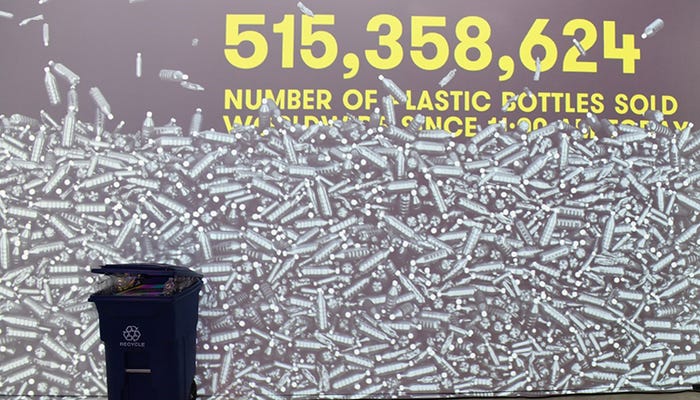“Question How You Hydrate” Campaign Aims to Reduce the World's Reliance on Single-use Plastics
The campaign includes a social media challenge, pop-up Museum of Plastic, new line of aluminum water bottles and more.

How do you hydrate? That is the question that Lonely Whale and Point Break Foundation are asking individuals, organizations and brands as part of their “Question How You Hydrate” campaign, a new movement that empowers consumers to choose and champion sustainable alternatives to single-use plastic water bottles.
Launched in conjunction with the new campaign created by Young Hero is social media challenge #HydrateLike, which asks individuals, organizations and brands to pledge their commitment to remove single-use plastic water bottles from their daily routines and replace them with sustainable alternatives, such as reusable bottles, household cups or aluminum cans.
“As a society, we continue to choose convenience over caring, and businesses that produce single-use plastics are not moving quickly enough to address the 8 million to 12 million metric tonnes of new plastic entering the ocean every year,” said Dune Ives, executive director of Lonely Whale, in a statement. “Through Question How You Hydrate, we are giving consumers the permission to #HydrateLike they give a damn, like the ocean matters, like future generations depend upon it. Personally, I’m going to #HydrateLike a mother and care for this planet and for my children’s future.”
To help campaign pledgers easily make the switch from single-use plastic bottles to sustainable alternatives, All Market Inc. (AMI), parent company of coconut water brand Vita Coco and organic energy drink brand Runa, has launched Ever & Ever, a new aluminum canned water brand.
Unlike single-use plastic water bottles, Ever & Ever aluminum bottles are easily and infinitely recyclable when disposed of correctly in a recycling bin. Nearly 75 percent of aluminum ever produced is still in use today, compared to 91 percent of plastic waste having never been recycled. Yet, one million single-use plastic bottles are sold every minute around the world, according to market research group Euromonitor.
“We are in the business of selling beverages in single-use packaging, and our team shares a passionate commitment to finding ways to neutralize our impact on the environment,” said Mike Kirban, CEO of AMI, in a statement. “As an agile, independent company, we know AMI is uniquely positioned to help address this issue, and we are so proud and eager to get this environmentally friendly water brand in the hands of our consumers.”
“Consumers are increasingly aware of the negative impact of single-use plastic, yet their choices in grocery and convenience stores are limited,” said Jane Prior, chief marketing officer of AMI, in a statement. “When recycled, an aluminum bottle can be turned into a new can in as little as 60 days, so we knew it was the most viable, sustainable alternative to single-use plastic water bottles. It’s been a sprint, but we’re excited to see Ever & Ever on store shelves around the U.S.”
Ever & Ever, a reverse osmosis water from infinitely renewable sources with added electrolytes for balance, is sold in 16-ounce Alumi Tek bottles from Ball Corporation for $1.99 each and in 12-packs for $23.99. Ever & Ever can be purchased on Ever & Ever’s website and Amazon, and it also will soon be available for purchase at retail stores nationally.
To help kick the campaign into full gear, on World Ocean’s Day (June 8), campaign leaders launched a pop-up Museum of Plastic in New York City. The museum, which is open for a limited time at 473-475 Broadway in Manhattan, is an interactive space of unique rooms designed to create a vision of a world without waste and inspire action to make a positive impact.
Ahead of the launch, Museum of Plastic was open for a cocktail reception and sneak peek, where Adrian Gallagher and Emma Riley of Lonely Whale and others spoke about the issue of plastic waste and what solutions are currently available to reduce plastic waste.
“When we launched #StopSucking, our goal was to wake the world up to the problem of plastic pollution using plastic straws as our gateway into the conversation,” said Adrian Grenier, co-founder of Lonely Whale, in a statement. “We’ve seen real change since then in individual habits, shifts in businesses’ practice and the introduction of new global policy targeting single-use plastic reduction. But this was always intended to be the first of many deliberate moves. Now, we’re turning our measured attention to single-use plastic water bottles, 500 billion of which are used every year around the world. This must change. That’s why, in honor of my mother who raised me to respect the natural world and to treat the ocean like my room—keep it clean—and all mothers, Lonely Whale is challenging all of us to question how we hydrate. If collectively, we opt to #HydrateLike a mother, reaching for a more sustainable way to hydrate instead of a single-use plastic bottle, we can start turning the tide. So, join us and #HydrateLike the ocean, the planet and future generations depend on it … because they do.”
Waste360 attended the cocktail reception and sneak peek of the Museum of Plastic. Flip through this gallery to see some images of the museum and the event.
About the Author(s)
You May Also Like


